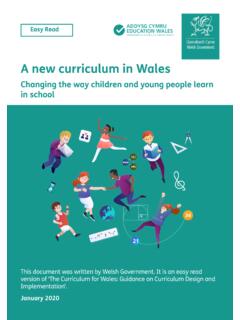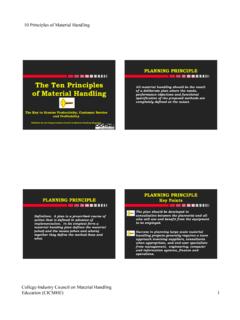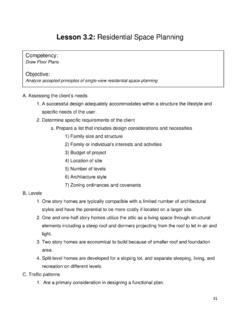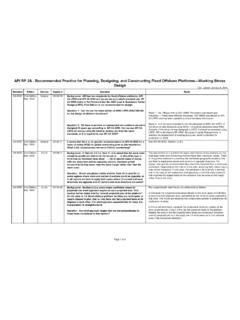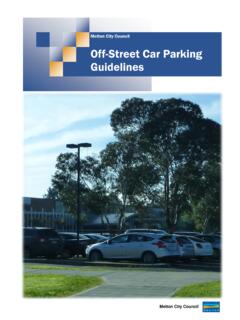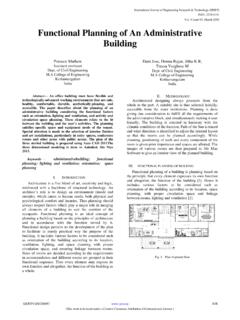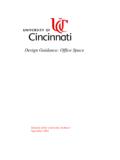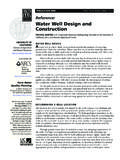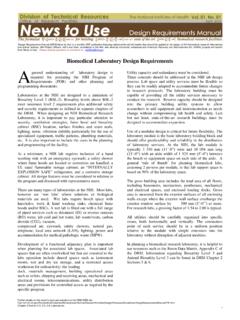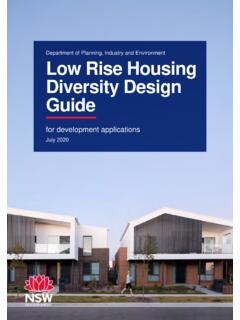Transcription of Curriculum for Wales guidance
1 Curriculum for Wales guidance Digital ISBN 978 1 80038 057 8 Crown copyright January 2020 WG39993 Contents Introduction to the Curriculum for Wales guidance 4 A vision for every school s Curriculum 5 The Curriculum for Wales framework 5 An integrated approach to learning and teaching 6 designing a school Curriculum 6 Progression and assessment at the heart of Curriculum design 8 Curriculum for Wales : summary of proposed legislation 10 Introduction 10 Purpose 10 Who does this Framework apply to? 11 Proposed legislative requirements the Curriculum requirements 11 Wider requirements 18 designing your Curriculum 21 Introduction 21 Developing a vision for Curriculum design 23 Your Curriculum design 34 Developing a methodology for designing your Curriculum 38 Developing a methodology for Curriculum design: Implementation and practical considerations 47 Expressive Arts area of Learning and Experience 53 Introduction 53 Statements of what matters 55 principles of progression 57 Descriptions of learning 59 designing your Curriculum 64 Health and Well-being area of Learning and Experience 73 Introduction 73 Statements of what matters 74 principles of progression 76 Descriptions of learning 78 designing your Curriculum 85 Humanities area of Learning and Experience 98 Introduction 98 Statements of what matters 100 principles of progression 103 Descriptions of learning 105 designing your Curriculum 116 Languages.
2 Literacy and Communication area of Learning and Experience 126 Introduction 126 Statements of what matters 127 principles of Progression 129 Descriptions of Learning 132 designing your Curriculum 156 Mathematics and Numeracy area of Learning and Experience 165 Introduction 165 Statements of what matters 167 principles of Progression 169 Descriptions of learning 171 designing your Curriculum 184 Science and Technology area of Learning and Experience 192 Introduction 192 Statements of What Matters 193 principles of Progression 195 Descriptions of Learning 196 designing your Curriculum 210 Supporting learner progression: Assessment guidance 221 Introduction 221 Our key principles 223 The purpose of assessment 224 Who needs to engage in the assessment process? 226 Evaluation and improvement arrangements and assessment 229 Planning for assessment within a school Curriculum 230 Developing a shared understanding of progression within and across schools 233 Transition along the 3 to 16 continuum 236 Communicating and engaging with parents/carers 237 Glossary 239 4 Introduction to the Curriculum for Wales guidance The Curriculum for Wales guidance aims to help each school develop its own Curriculum , enabling their learners to develop towards the four purposes of the Curriculum the starting point and aspiration for every child and young person in Wales .
3 This guidance will also be relevant for funded non-maintained nursery settings, pupil referral units (PRUs) and those responsible for the provision of education other than at school (EOTAS) in other settings, enabling them to develop an understanding of the Curriculum for Wales Framework (Framework). The Curriculum for Wales guidance sets out: the proposed Curriculum requirements set out in legislation for all learners aged 3 to 16, to ensure all schools cover the same core learning and to secure a consistency of approach for learners across Wales guidelines for schools in developing their curricula expectations around assessment arrangements to support learner progression. It consists of the following. Introduction to the Curriculum for Wales guidance . guidance for legislation an outline of proposed legislation. designing your Curriculum general guidance on developing a Curriculum across all areas of learning and experience ( area /Areas).
4 Introduction to each area of learning and experience. Statements of what matters the big ideas and key principles in each area . principles of progression how learners make progress throughout their learning across the Curriculum . Descriptions of learning how learners should make progress within each statement of what matters. designing your Curriculum principles for each area more area -specific guidance on developing a Curriculum . Supporting learner progression assessment guidance . A Curriculum and Assessment Bill is proposed for introduction in the Senedd in 2020. To assist schools to develop their Curriculum , we will publish the Curriculum for Wales guidance . This is an early version of that guidance and its purpose is to help schools to start thinking about designing their Curriculum and the assessment arrangements to support it. 5 A vision for every school s Curriculum Improving education is our national mission.
5 Nothing is so essential as universal access to, and acquisition of, the experiences, knowledge and skills and that our young people need for employment, lifelong learning and active citizenship. The Curriculum for Wales guidance is a clear statement of what is important in delivering a broad and balanced education. The four purposes are the shared vision and aspiration for every child and young person. In fulfilling these, we set high expectations for all, promote individual and national well-being, tackle ignorance and misinformation, and encourage critical and civic engagement. A school s Curriculum is everything a learner experiences in pursuit of the four purposes. It is not simply what we teach, but how we teach and crucially, why we teach it. Curriculum development should be at the heart of practitioner, school and national efforts which seek to raise standards for all, tackle the attainment gap, and ensure an education system that is a source of national pride and enjoys public confidence.
6 This development will also contribute to our goals as a nation as set out in the Well-being of Future Generations ( Wales ) Act 2015. It is also an important vehicle for embedding the United Nations Convention on the Rights of the Child (UNCRC) in the experience of learning and teaching for our children and young people and for giving them an understanding of their rights. The Curriculum for Wales Framework The Curriculum for Wales guidance forms part of the Curriculum for Wales Framework (Framework). The Framework is determined nationally and includes both the Curriculum requirements, which will be set out in legislation, and a range of supporting guidance . The Curriculum for Wales guidance , and the other guidance we are publishing alongside it, is the result of co-construction. It has been developed in Wales , by practitioners for practitioners, bringing together educational expertise and wider research and evidence.
7 It has been published primarily to help schools begin to design their own Curriculum . It contains information on the proposed legal requirements, guidance on how to develop a school Curriculum , and an explanation of the purposes and principles of assessment. Assessment should be intrinsic to Curriculum design. Funded non-maintained settings, pupil referral units (PRUs) and those responsible for the provision of education other than at school (EOTAS), will not be required to design a Curriculum in the same way as a maintained school or maintained special school and further, more specific guidance will be published for these settings in 2021 to support them in fulfilling their legal obligations in relation to the Framework. 6 The Curriculum for Wales guidance is initial guidance and if the Curriculum and Assessment Bill is passed by the Senedd, it will be revised to reflect any changes.
8 What s different An integrated approach to learning and teaching The Framework is designed to help practitioners to develop a more integrated approach to learning. The six Areas bring together familiar disciplines and encourage strong and meaningful links across different disciplines. Those individual disciplines will still play an important role, especially as learners progress and begin to specialise. The Curriculum for Wales guidance promotes collaboration and cross-disciplinary planning, learning and teaching, both within and across Areas. This will enable learners to build connections across their learning and combine different experiences, knowledge and skills. There are 27 statements of what matters in this Framework. These ensure a level of consistency in Curriculum design across settings and schools, as learners must develop an understanding of all statements. The process of exploring and revisiting these statements will enable learners to develop ever deeper knowledge over the learning continuum and to progress to a more sophisticated understanding of the key knowledge, ideas and principles in each area .
9 This more sophisticated understanding allows learners to value how their learning contributes to these ideas and why it is important, rather than simply being able to recall isolated facts without understanding the context. This progression should be supported by a variety of assessment approaches which enable the learner and the practitioner to understand where a learner is and what they need to do next. The Framework does not require settings and schools to develop a timetable explicitly structured along the lines of the Areas or to organise the setting or school or staffing on that basis. designing a school Curriculum A defining feature of the Framework is that it requires schools to design their own Curriculum and assessment arrangements. By itself, it is not an off the shelf programme for delivery. Our new approach recognises: the role of leadership in enabling high-quality learning and teaching.
10 Establishing a high-performing education system through high-quality learning and teaching depends on building its professional capacity, developing local leadership, responsibility and decision-making 7 within the national framework, schools and practitioners are best placed to make decisions about the needs of their specific learners, including choosing topics and activities which will best support their learning the importance of meaningful learning: A content-focused Curriculum does not guarantee meaningful learning, only that certain topics are covered to varying extents; instead, the Curriculum for Wales guidance articulates what concepts and essence of learning should underpin a range of different topics, learning activities and acquisition of knowledge the need for innovation and creativity: Practitioners select content, enabling them to use their professional skills to drive improved learning and outcomes for their learners the scope for practitioners to make greater links between Areas and disciplines: Practitioners will have the licence to use topics and activities to combine meaningful learning from different Areas, disciplines and concepts.



